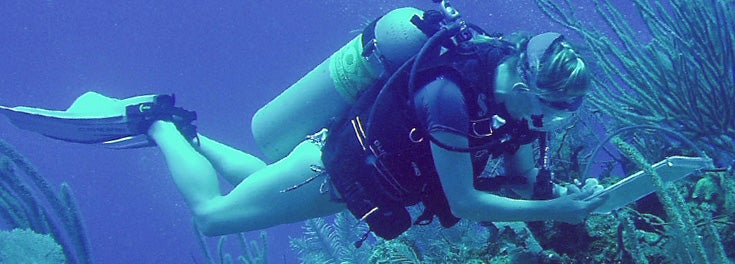
Okay, we need classrooms. But they all don’t need to have four walls. Rhode Island is the Ocean State, after all, and URI has made good use of this beautiful natural resource with a boatload of special marine-based programs.
If you’re studying wildlife biology, you might just travel to the Caribbean to record reef fish populations, Thailand and Malaysia to study the effects of pollutants and invasive predators on native wildlife, and Costa Rica to examine mammal diversity on coffee plantations. Or, in our local waters, you might study the potential impact of offshore energy production on migratory duck populations.
There’s nothing like being by the sea, and at URI you’ll get some of the most innovative academic—and seaworthy—experiences around.
If history, art, or anthropology’s your thing, and you like the water, perhaps you’ll choose an interdisciplinary minor in underwater archaeology and head out to Bermuda to explore one of the best collections of historic shipwrecks in the Western Hemisphere or to the Israeli Coast for a combined terrestrial and underwater field study.
In our first-in-the-nation ocean engineering program, you’ll take classes on URI’s Narragansett Bay campus, overlooking—that’s right—Narragansett Bay. You can study underwater acoustics, tsunamis, coastal circulation, marine geo-mechanics, ocean structures, offshore energy generation, and ocean robotics—and maybe join our award-winning robotics team. Our 30-meter wave tank is used in experiments related to ship propulsion, trawl fishing dynamics, underwater vehicle drag and more, while our freshwater acoustics testing tank is used for research in underwater diver communication systems and sonar system development. And you might collect ocean soil samples (and other stuff) from the University’s R/V Shanna Rose.
Our aquaculture program draws students from all over the U.S. and many foreign countries to research species conservation, improve commercial production, and build sustainable fisheries. Our multiple aquaculture labs stretch from Kingston to our Narragansett Bay campus, into the coastal lagoons, and six kilometers into the Bay. Not to mention R/V Cap’n Bert, a 53-foot stern trawler, which is used for one of the longest-running studies of fish and invertebrate populations anywhere in the world.
That’s not the only research vessel that makes a great classroom. The 185-foot R/V Endeavor takes scientists, students, and K-12 educators from URI and beyond to sea for research expeditions in the nearby Rhode Island waters and as far away as the Mediterranean and Black Seas to the Easter and Galapagos Islands in the South Pacific. Take a look and see where the R/V Endeavor is today!
But wait, there’s more. We haven’t even touched on our Natural Products lab, which is working to develop new pharmaceuticals from marine organisms; our combined oceanography and business degree; our classes in academic and scientific diving; or the multi-disciplinary research our students and faculty are doing to make an offshore wind farm in Rhode Island a reality. And that’s not all.
There’s nothing like being by the sea, and at URI you’ll get some of the most innovative academic—and seaworthy—experiences around. And, just in case you need to relax and grab a little downtime, there’s always the beach!
Pictured: One of Professor Graham Forrester’s students taking a survey of coral reef fish in the Caribbean Ocean.
